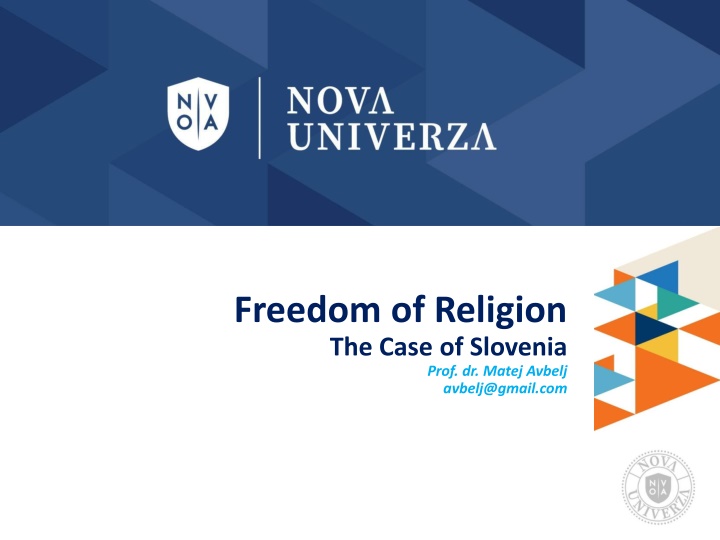
Freedom of Religion in Slovenia: Constitutional Principles and Human Dignity
Explore the constitutional system of Slovenia with a focus on freedom of religion, human dignity, and democratic principles. Learn about the historical context, vestiges of the past, and the importance of respecting human rights within the constitutional order.
Download Presentation

Please find below an Image/Link to download the presentation.
The content on the website is provided AS IS for your information and personal use only. It may not be sold, licensed, or shared on other websites without obtaining consent from the author. If you encounter any issues during the download, it is possible that the publisher has removed the file from their server.
You are allowed to download the files provided on this website for personal or commercial use, subject to the condition that they are used lawfully. All files are the property of their respective owners.
The content on the website is provided AS IS for your information and personal use only. It may not be sold, licensed, or shared on other websites without obtaining consent from the author.
E N D
Presentation Transcript
Freedom of Religion The Case of Slovenia Prof. dr. Matej Avbelj avbelj@gmail.com
SI Constitutional System Vestiges of the Past Freedom of Religion
Main Characteristics of the National Constitutional System Republic Parliamentary Democracy Two-tiered Judiciary: - Ordinary Courts - Constitutional Court Review of Constitutionality and Legality Concentrated Judicial Review Abstract Concrete Constitutional Complaint
Vestiges of the Past Prior to 1918 The Habsburg Empire 1918 The Vidovdan Dictatorship 1945 1990: Totalitarian Communist System 1991 Constitutional, Value-Based Discontinuity Constitutional Court Decision U-I-109/10 (Tito Street Case)
By adopting the independence documents not only the fundamental relationship entailing state sovereignty between the Republic of Slovenia and the Socialist Federal Republic of Yugoslavia (hereinafter referred to as: the SFRY) was severed, but there was also a fracture with the fundamental value concept of the constitutional order. Differently than the former SFRY, the Republic of Slovenia is a state whose constitutional order proceeds from the principle of respect for human rights and fundamental freedoms. Human dignity is the fundamental value which permeates the entire legal order and therefore it also has an objective significance in the functioning of authority not only in individual proceedings but also when adopting regulations.
As the fundamental value, human dignity has a normative expression in numerous provisions of the Constitution; it is especially concretized through provisions which ensure individual human rights and fundamental freedoms. As a special constitutional principle, the principle of respect for human dignity is directly substantiated in Article 1 of the Constitution, which determines that Slovenia is a democratic republic. The principle of democracy in its substance and significance exceeds the definition of the state order as merely a formal democracy, but substantively defines the Republic of Slovenia as a constitutional democracy, thus as a state in which the acts of authorities are legally limited by constitutional principles and human rights and fundamental freedoms. This is because individuals and their dignity are at the centre of its existence and functioning. In a constitutional democracy the individual is a subject and not an object of the functioning of the authorities, while his or her (self)realization as a human being is the fundamental purpose of the democratic order.
Article 7 The state and religious communities shall be separate. Religious communities shall enjoy equal rights; they shall pursue their activities freely.
Article 14 (Equality before the Law) In Slovenia everyone shall be guaranteed equal human rights and fundamental freedoms irrespective of national origin, race, sex, language, religion, political, or other conviction, material standing, birth, education, social status, disability, or any other personal circumstance. All are equal before the law.
Article 41 (Freedom of Conscience) Religious and other beliefs may be freely professed in private and public life. No one shall be obliged to declare his religious or other beliefs. Parents have the right to provide their children with a religious and moral upbringing in accordance with their beliefs. The religious and moral guidance given to children must be appropriate to their age and maturity, and be consistent with their free conscience and religious and other beliefs or convictions.
Article 46 (Right to Conscientious Objection) Conscientious objection shall be permissible in cases provided by law where this does not limit the rights and freedoms of others.
Article 63 (Prohibition of Incitement to Discrimination and Intolerance and Prohibition of Incitement to Violence and War) Any incitement to national, racial, religious, or other discrimination, and the inflaming of national, racial, religious, or other hatred and intolerance are unconstitutional. Any incitement to violence and war is unconstitutional.
Landmark case: Decision U-I-92/07 Questions: The content of the right under Art 41 Positive and negative aspect of the right of an individual Positive and negative duty of the state Individual and Collective dimension of the right Relationship to Art 7 and its meaning (par. 189) Freedom of Religion in Public Schools (par. 170) Priests as Civil Servants (Prisons, Hospitals, Miltary) State funding of religious communities 1. 2. 3. 4. 5. 6. 7. 8.
The subject of protection afforded by Article 41 of the Constitution is theistic, atheistic, and non-theistic convictions in the sphere of ethics and morality, the internal and external characteristics of which indicate their consistency, cogency, seriousness, cohesiveness, and importance.
At the deepest level, freedom of religion entails the right of a natural person to have a religion and freely change it (the positive aspect) and the right not to belong to any religion (the negative aspect). Owing to their nature, these inner convictions cannot be subject to any regulations or restrictions (i.e. forum internum as a special form of the freedom of thought). The right to the free profession of one s religion (as a special form of the freedom of expression) and the freedom to exercise one s religion (as a special form of the freedom of practice) entail an external manifestation of one s inner personal decisions (i.e. forum externum). Freedom of religion may be manifested individually or collectively.
In the broad sense, the principle of the separation of the State and religious communities referred to in the first paragraph of Article 7 of the Constitution has three core elements: (1) the religious and philosophical neutrality of the State, (2) the autonomy of religious communities in their own domain, and (3) the State s equal relation to the religious communities. The aim of this principle is to ensure, through the neutral attitude of the State, true freedom of conscience and the equality of individuals believers and nonbelievers and religious communities. The religious and philosophical neutrality of the State does not constitute an impediment to cooperation with religious communities. The autonomy and equality of religious communities, which are determined in the Constitution as independent principles, are the mirror images of the requirement of the neutrality of the State and the tools for ensuring the human right determined by Article 41 of the Constitution.
The human right to freedom of conscience is the basis of the regulation of the position of religious communities and, in that respect, it takes precedence over the constitutional principles defining the position of religious communities in relation to the State. This entails that everything that falls within the scope of the exercise of the right to freedom of religion determined in Article 41 of the Constitution cannot be inconsistent with the principle of the separation of the State and religious communities.
The State does not have the duty to fund religious communities on the basis of Article 41 of the Constitution. Nevertheless, the State may provide financial support to religious communities while respecting the equality of religious communities, provided this does not run counter to the principle of the separation of the State and religious communities. Interpreting this in such a way that the State is allowed to test the acceptability of the values of the substance of such convictions and that it may financially support only those religious communities whose substantive convictions are aligned with those of the State would be inconsistent with the requirement of neutrality guaranteed by the principle of the separation of the State and religious communities.
Although state funding of religious spiritual care in prisons and hospitals does not fall within the scope of the human right referred to in the first paragraph of Article 41 of the Constitution, the State may provide religious communities with the necessary financial resources for the performance of such care to such an extent and in such a manner which is not inconsistent with the principle of the separation of the State and religious communities.
Freedom of Religion The EU and Comparative Dimension Prof. dr. Matej Avbelj avbelj@gmail.com
Two contentious cases Religious Objections to Same-Sex Marriage The Right to Equal Treatment of Same-sex couples in all family relations Slovenian CC U-I-486/20, Up-572/18 in U-I-91/21, Up-675/19 The Wedding cake decision US SC Masterpiece Cakeshop v. Colorado Civil Rights Commission, 584 U.S. ___ (2018)
Two contentious cases Slaughtering of Animals for Religious Purposes Decision of SI Constitutional Court U-I-140/14 Opinion of AG C-336/19 Decision CJEU C-336/19 Religious Objections to Same-Sex Marriage The Wedding cake decision US SC






















